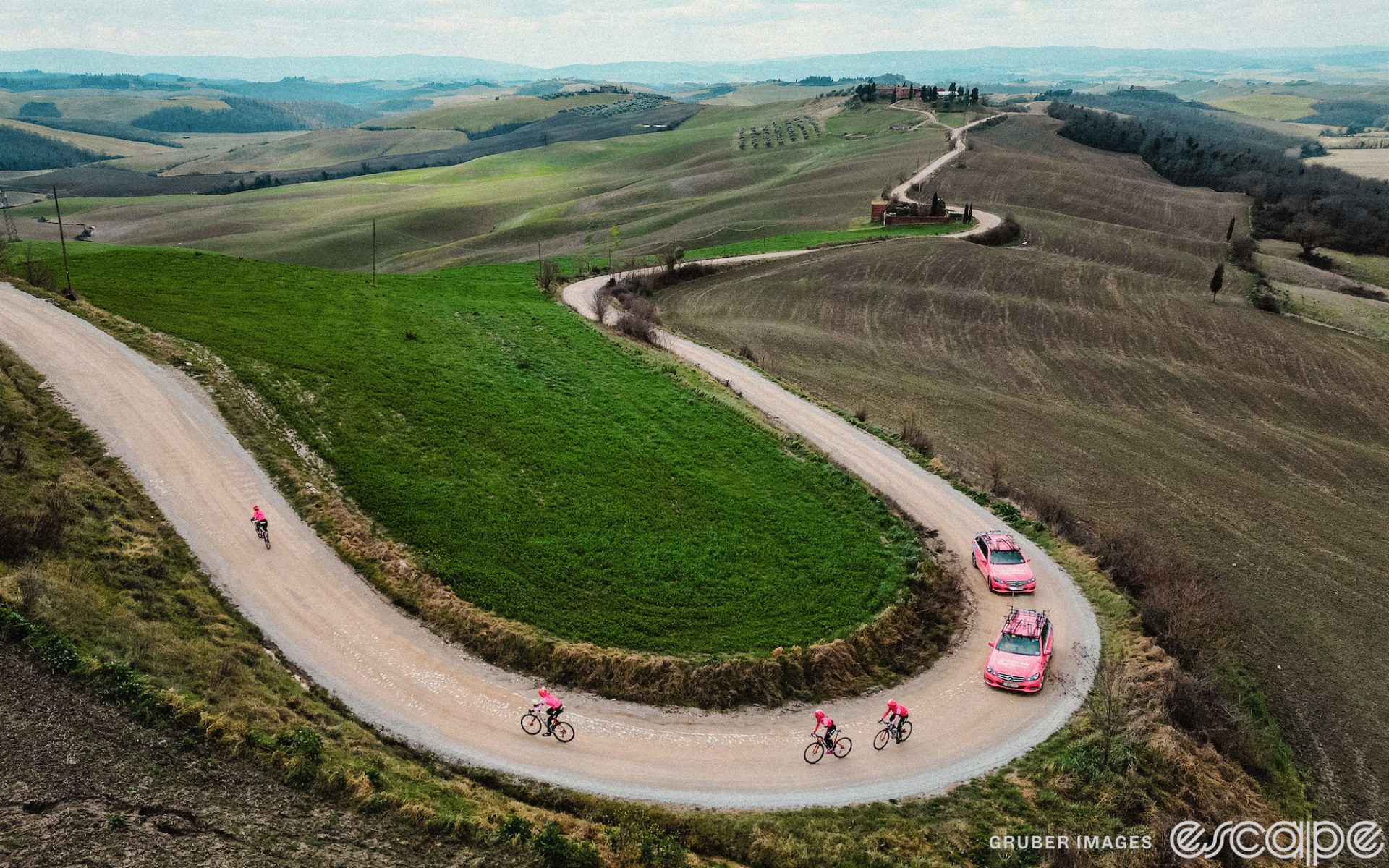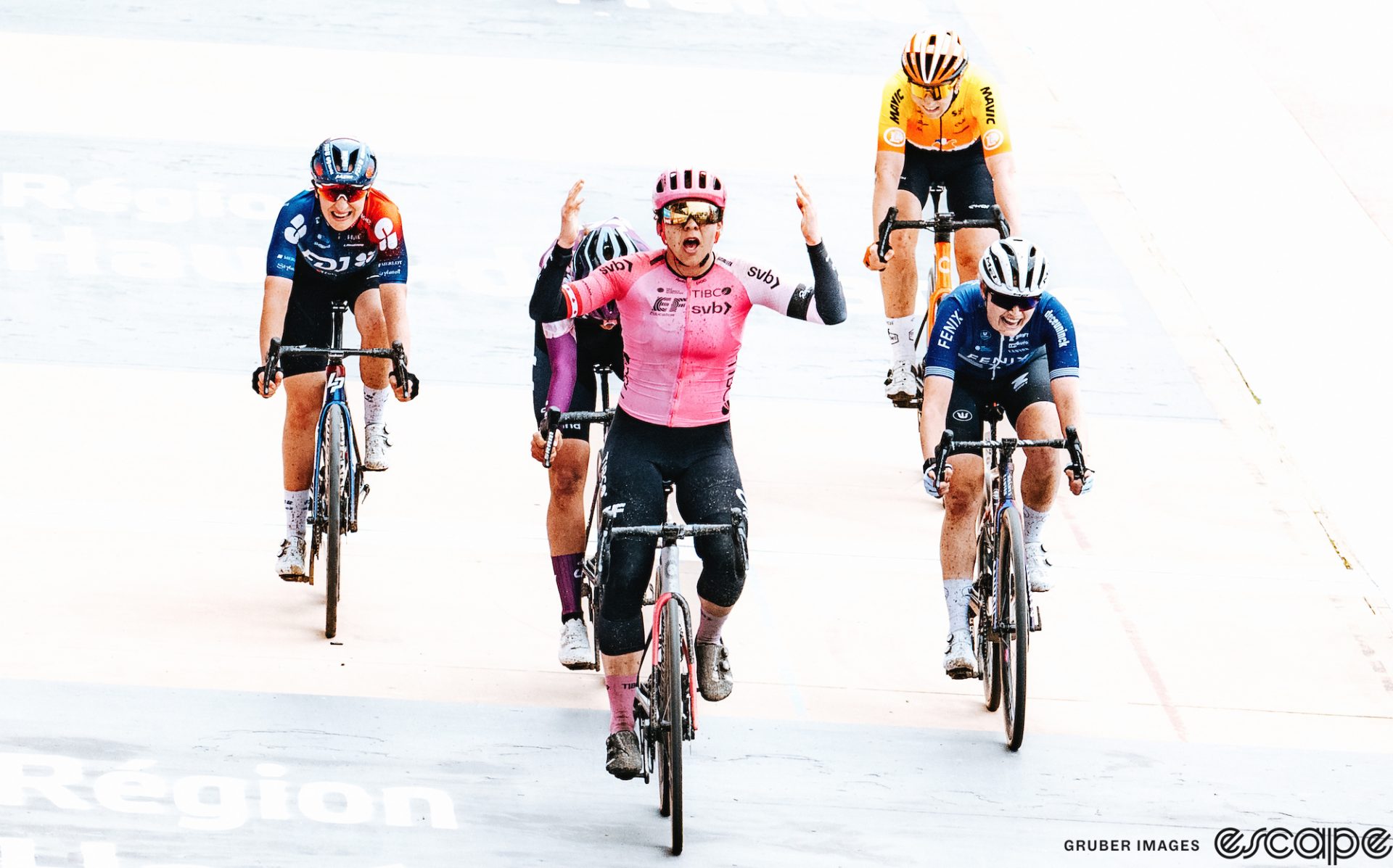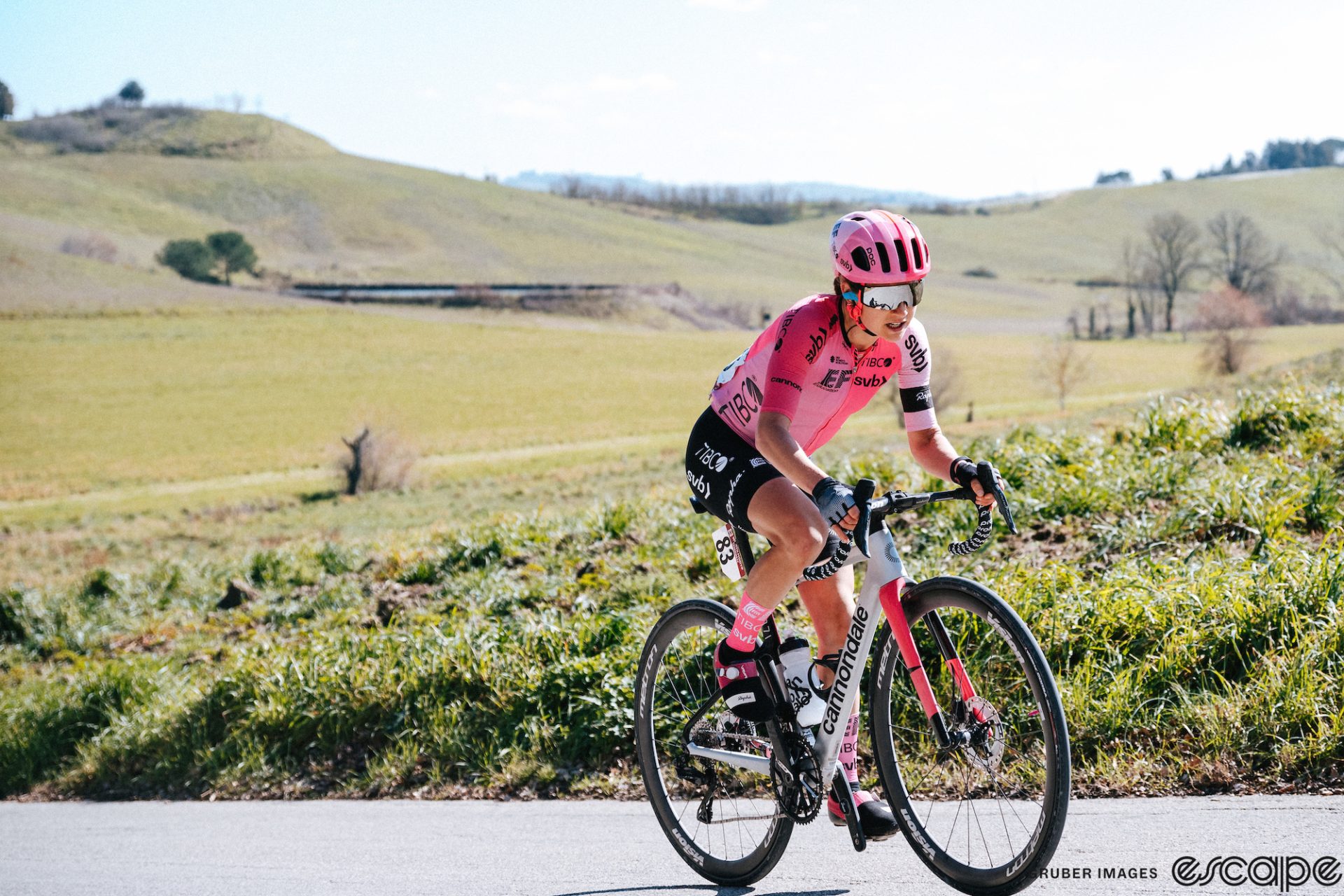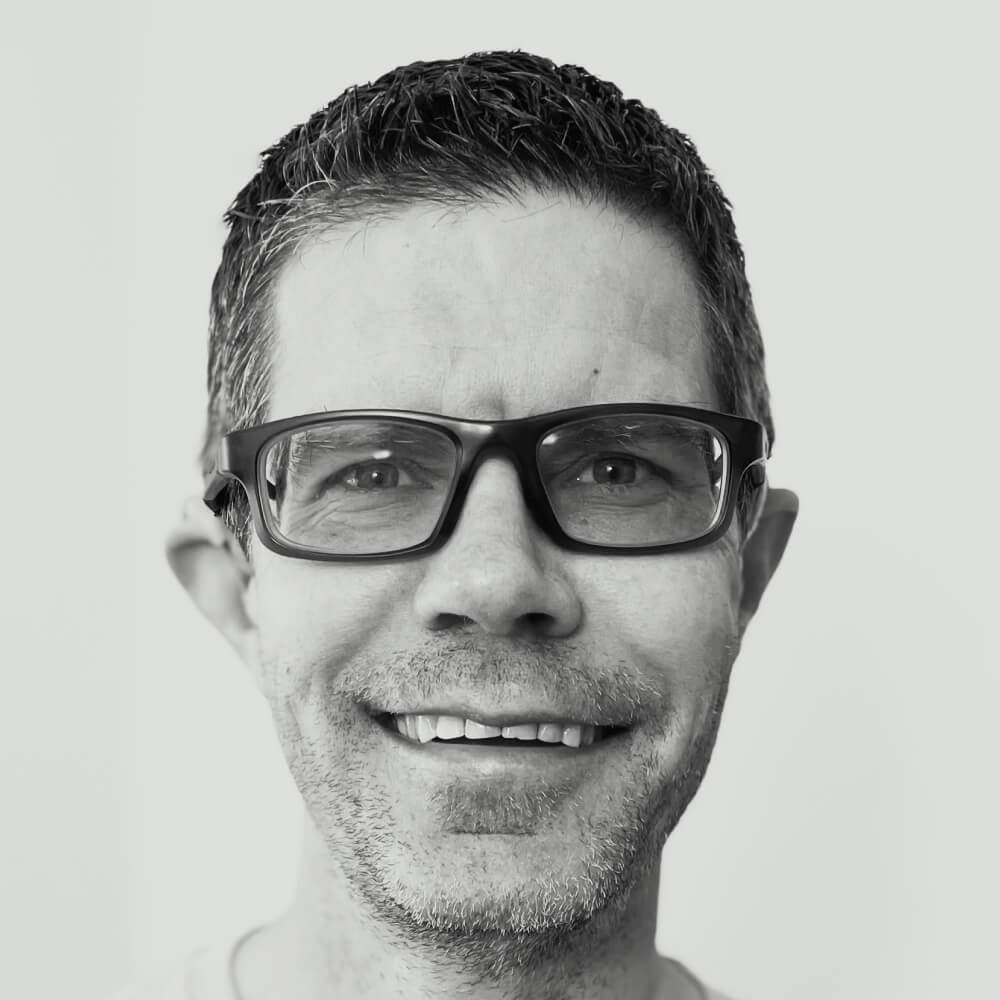On Monday the nascent EF Education-Cannondale women’s cycling team announced its first signee: climber and GC rider Veronica Ewers, signed through 2025. Even though Ewers currently races for EF, it’s not characterized as a renewal. That’s because EF only sponsors the current team, and will part ways from it after 2023 to start its own, wholly owned enterprise like on the men’s side of the sport. But Ewers wasn’t the first high-profile announcement.
Last week, the team named former Jumbo-Visma women’s manager Esra Tromp as its new GM. Escape Collective caught up with her Monday morning, just before the Ewers signing was announced, to learn more about what the next year holds.
This interview has been lightly edited for length and clarity.
***
Escape Collective: You just started, so what’s Week 1 been like for you? What’s it like integrating with the EF organization?
Esra Tromp: Yeah, the announcement was last week but I started a little earlier. That gave me a bit more time to integrate. And of course, I’m still new, and we are building a team in an existing organization. So I need to get to know a lot of people, need to figure out how the structure works.
I actually started the first week of the men’s Tour de France. I joined the team in Bilbao, which was really cool, and got introduced to a lot of people on the team, kind of a kick-start. I spoke with Jonathan Vaughters and Maria Norrman from EF, about the team, the structure, the culture, all these kinds of things, but seeing it there in practice is really good, really helpful. I’m getting to understand the team philosophy more and more.
You were with Jumbo-Visma until April, and at the time you left, it wasn’t announced why, what you were leaving for. What were you looking to do?
Yeah, I worked there over two and a half years, almost three, and I learned a lot. But I was open for a new challenge after that time, and wanted to take some time off. So I had two and a half months, something like that, for family and friends, thinking about what my next step in my career will be. I had a really good conversation with Maria and Jonathan and felt really comfortable immediately. The idea of the team, starting a new team completely from scratch, that’s a challenge I love to do – organization building. So the new foundation is something I really like. It’s a big challenge, but I am super motivated.
You also started the women’s team at Jumbo, so in some ways this is a pretty similar opportunity. What drew you back to something so similar, that you’d kind of already done?
Yeah it is something I’ve done, so I have experience. But as with everybody who develops as a person, personally and professionally, you have some mistakes or learning. So I found it really cool that I have this opportunity again, and I can really build it from scratch and have a little bit more time now.
With Jumbo, there was a really short timeframe. Now I have more time to build and can take a little bit more time to investigate, “OK, which riders and staff members, for example, I would like to work with,” and I see the bigger picture. I wanted to use my experiences from the past in this venture.
And in some ways, it isn’t like Jumbo, because EF currently sponsors a WWT team. I know that this team will be new, but there’s a lot of institutional experience and there have been some complications separating from that team and starting a new one. So what about this feels different to you?
Yeah, I think the biggest difference between then and now is, how do you say it, it’s sensitive when riders and staff members change teams, so you always need to keep that in mind. It’s a sensitive topic to everybody involved. So I try to keep that in mind and build a team openly. But to be honest, I see it as different teams. It’s not really different than speaking from riders from a different team than the current EF team.
You mentioned mistakes you’d made previously, or things you would do differently. Do you have a sense of where those challenges are? When you look at your experience, what do you say, “OK, here’s what I want to avoid, to do differently”?
Yeah, in the first few weeks I have focused a little bit more on the riders. That’s partly because this is the period of transfers, and negotiations with riders, so I’m focusing more [on that] now, but I want to invest a lot of time finding the best combination and staff I think to start with in the foundation of the team. That’s something I learned from past experiences: that finding the right person for the job is to really know, “OK, what is this job and what do we think somebody needs to bring to the team?” and find the best combination.
So for me, finding out those things and finding the right person for the job. But if I find the right person, then she needs to fit also into the group because in the team behind the team, these characteristics need to work together really well as a unit. So in the last few years I learned how to take more time to really interview different people to find the best combination of the person for the job.
And it’s the same thing with the riders. They have different characteristics, different profiles, and it’s important that we have balanced unity. Everyone has talent and strong points, weak points. And we need to balance it out as much as possible, encourage each other to show the strength more than the weakness.

I think there’s still a fair bit of confusion among fans about what’s actually happening with the team. They look at EF and say “it has a team, yet there’s going to be a new team next year? How does that work with riders and staff?” So do you have a sense yet of what we’ll see with turnover? How many new faces, or is it a new team in name, but a lot of the faces will be familiar?
It will be very much new. We will announce the first rider soon [that was Ewers, just shortly after our call – Ed.] and in the next couple of days we will announce a lot of signings.
So you’re focused mostly on rider recruitment, then staff?
My first priority was riders, also because of the timing. Normally from August 1 is this period of transfers open, but we all know that we speak [with riders and agents] a little bit earlier. So my first priority was riders. It takes a lot of time to interview and get to know them and see, “OK, where are they? What kind of riders do we have?” There’s some data research as well. I got some help from the team on data research and did a lot of interviews. In the meantime I had some chats with potential staff, but the majority of riders are on contract now, and just the last few details of the contracts to make sure I have the amount of riders I want in the team.
The team will have a Continental license next year, so you’ll be looking for wildcard invitations to race. Are you starting to reach out to promoters and figure out what the calendar looks like?
Yeah, it’s highly possible we are Continental next year and so we need invitations to races, especially WorldTour races. We have really good contacts with the organizers, from the men’s organization, and nowadays the organizers are the same for men and women [races] like ASO, Flanders Classics, and with RCS organizing next year the Giro [Donne]. And I have a lot of contacts from my past jobs.
So in the next few weeks we will reach out to them individually to make sure we have a good program next year. We have good riders, a good roster for next year, and I think this team is standing out in the marketing, how we present ourselves. I think also in the race tactics we will be willing to show ourselves in races. So I think for organizers, it’s cool to have EF at the start line. We need to build the program; we’re not there yet. But I’m confident we’ll have a really good program.
On the men’s side, EF has a strong cultural identity that comes partly from Jonathan Vaughters. And you’ve mentioned your goal for the first year is for the team to get good riders, be competitive in the big races. But as you build the team, what is the culture of an Esra Tromp team?
That’s my goal to be really visible in the races next year already. It’s hard to put out that, “OK, we need to win these elite races next year,” because you’re a new team, you need to get used to each other. In the long term, my goal and the team’s goal is to be one of the best teams in the world. There’s a long way to go, and we have some time to build this. But in the end, my vision is you’re the best team in the world. You can play the game and be in to win a race in different fields, different types of races: Classics races, sprint races, GCs, time trials, to be a strong, solid team where a lot of riders in the team are potential winners, not just one rider who can win the races.
In a cultural way, I’m not Jonathan Vaughters; he is one of a kind. But I got to know him the past few weeks pretty well. We speak daily with each other. And I thought we could have some challenges and we’ll probably have in the future, but for now it’s going really well. We think about the same way a lot of the time, and that’s really cool. For me, it’s really important to have a really open culture, a diverse team with different personalities, different characters, different types of riders. A really open culture means it’s important to speak out about what is bothering you, and encouraging each other, to find the balance between where we are and want to be in the end.
You always perform the best if you’re relaxed and in a fun environment where you can be yourself, you can laugh with each other. The riders and the staff are away from home so much, so many days, and yeah, it’s important you feel really well in the team, that you are looking forward to go on the road with your second family. So that’s something I really want to invest time in. In the next months, especially during the winter, I would like to invest time in this with team-building, probably doing some crazy things. I’m not sure yet what to organize, but little ideas are coming up.

You mentioned your goal of being the best or or one of the best teams in the peloton. What do you need to do to get there, and how long does it take?
In the end, we need to outsmart a few really good teams. There are a lot of good teams in the women’s peloton. To be better than them is a challenge. We need to outsmart them in tactics, we need to think, sometimes, a bit out of the box.
I’m quite a fan of searching for riders who have not already been a long time in the sport. A good example is Primož Roglič from ski jumping, right? I think we could do that more and more in women’s cycling as well, to outsmart in scouting for riders. And we need a really good, stable foundation and performance environment for the riders. So yeah, it will take some time. It’s a big challenge.
When we look at the teams at the top, there’s obviously one that stands out with SD Worx as one superteam. How do you get to the level of a team like that, or how does women’s cycling rebalance so that it’s not so much focused in one team?
I think it’s good that there is something like a target. Like, “OK, they are now the best, so what are they doing?” Figuring out what is the secret of this team and how it sets the bar is a challenge to other teams to think different and have different ways of strategy or different riders in the group. Whatever it takes to be better or competitive. That’s a really cool challenge: if we want to be better we need to outsmart them on a lot of topics.
In the Tour de France in the end Demi (Vollering) won, who is a talent I spotted in the past in my work at Parkhotel Valkenburg. So I’m really happy that she won the race and I think she’s a good ambassador for women’s cycling, but in the first few days there were other teams winning the races with tactics, or took the challenge and dared to be really aggressive with their racing.
I think a lot of teams were a little bit afraid, or settling. Especially in the first few months of the season they said maybe we don’t have the strength of SD Worx and we will settle for third or fourth or whatever. But now we saw, “OK, if we race aggressive, it opens doors and we can actually win.” It doesn’t need to be bad for women’s cycling that we have a year like this. It challenges everybody to come better and it sets the bar. I think that’s really cool. [SD Worx] do some things really well. So let’s learn from it and try to become as good or even better in the future.
What did you think of this story?

